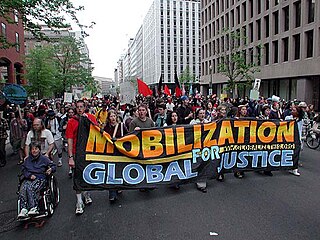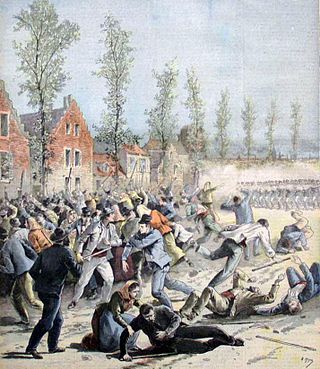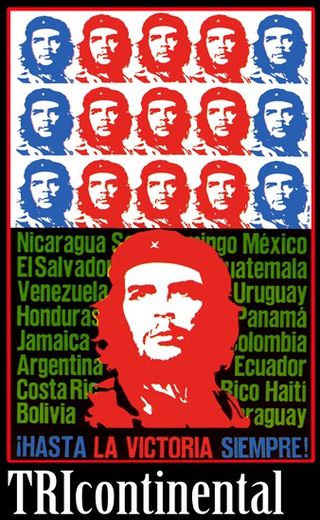
The Zapatista Army of National Liberation, often referred to as the Zapatistas, is a far-left political and militant group that controlled a substantial amount of territory in Chiapas, the southernmost state of Mexico.

A black bloc is a tactic used by protesters who wear black clothing, ski masks, scarves, sunglasses, motorcycle helmets with padding or other face-concealing and face-protecting items. The clothing is used to conceal wearers' identities and hinder criminal prosecution by making it difficult to distinguish between participants. It is also used to protect their faces and eyes from pepper spray, which is used by police during protests or civil unrest. The tactic also allows the group to appear as one large unified mass. Black bloc participants are often associated with anarchism, anarcho-communism, communism, libertarian socialism and the anti-globalization movement. A variant of this type of protest is the Padded bloc, where following the Tute Bianche movement protestors wear padded clothing to protect against the police.

The 1999 Seattle WTO protests, sometimes referred to as the Battle of Seattle, were a series of anti-globalization protests surrounding the WTO Ministerial Conference of 1999, when members of the World Trade Organization (WTO) convened at the Washington State Convention and Trade Center in Seattle, Washington on November 30, 1999. The Conference was to be the launch of a new millennial round of trade negotiations.
The European Social Forum (ESF) was a recurring conference held by members of the alter-globalization movement. In the first few years after it started in 2002 the conference was held every year, but later it became biannual due to difficulties with finding host countries. The conference was last held in 2010. It aims to allow social movements, trade unions, NGOs, refugees, peace and anti-imperial groups, anti-racist movements, environmental movements, networks of the excluded and community campaigns from Europe and the world to come together and discuss themes linked to major European and global issues, in order to coordinate campaigns, share ideas and refine organizing strategies. It emerged from the World Social Forum and follows its Charter of Principles.

La Vía Campesina is an international farmers organization founded in 1993 in Mons, Belgium, formed by 182 organisations in 81 countries, and describing itself as "an international movement which coordinates peasant organizations of small and middle-scale producers, agricultural workers, rural women, and indigenous communities from Asia, Africa, America, and Europe".
The Organization of Solidarity of the Peoples of Asia, Africa and Latin America, abbreviated as OSPAAAL, was a Cuban political movement with the stated purpose of fighting globalisation, imperialism, neoliberalism, and defending human rights. The OSPAAAL was founded in Havana in January 1966, after the Tricontinental Conference, a meeting of over 500 delegates and 200 observers from over 82 countries.
Pietro Ameglio is a Uruguayan-born naturalized Mexican citizen and Gandhian civil rights and peace activist best known for his role in promoting nonviolence and creating a movement for peace and anti-militarism in Mexico.
The Hong Kong People's Alliance on WTO is a grassroots organization that aimed to protest at the WTO Ministerial Conference of 2005 which was held in Hong Kong Convention and Exhibition Centre in Wan Chai North on 13–18 December 2005.
Subcomandante Elisa is a Mexican activist from Monterrey, Nuevo León. In the 1980s and early 90s, she served as a subcomandante in the Zapatista Army of National Liberation (EZLN). She was arrested in February 1995 in connection with the 1994 Zapatista uprising. In 1996, the Mexican government acknowledged it was a wrongful arrest and acquitted her of all charges. Today, she is a professor at the Autonomous University of Social Movements.
Prefigurative politics are the modes of organization and social relationships that strive to reflect the future society being sought by the group. According to Carl Boggs, who coined the term, the desire is to embody "within the ongoing political practice of a movement [...] those forms of social relations, decision-making, culture, and human experience that are the ultimate goal". Besides this definition, Leach also gave light to the definition of the concept stating that the term "refers to a political orientation based on the premise that the ends a social movement achieves are fundamentally shaped by the means it employs, and that movement should therefore do their best to choose means that embody or prefigure the kind of society they want to bring about". Prefigurativism is the attempt to enact prefigurative politics.

Neozapatismo or neozapatism is the political philosophy and practice devised and employed by the Zapatista Army of National Liberation, who have instituted governments in a number of communities in Chiapas, Mexico, since the beginning of the Chiapas conflict. According to its adherents, it is not an ideology: "Zapatismo is not a new political ideology or a rehash of old ideologies. .. There are no universal recipes, lines, strategies, tactics, laws, rules or slogans. There is only a desire: to build a better world, that is, a new world." Many observers have described neozapatismo as libertarian socialist, anarchist, or Marxist.
1984 Network Liberty Alliance is a loose group of software programmers, artists, social activists and militants, interested in computers and networks and considering them tools to empower and link the various actors of the social movement around the world. They are part of the hacktivism movement.
On 1 January 1994, the Zapatista Army of National Liberation (EZLN) coordinated a 12-day uprising in the state of Chiapas, Mexico in protest of the enactment of the North American Free Trade Agreement. The rebels occupied cities and towns in Chiapas, releasing prisoners and destroying land records. After battles with the Mexican Army and police, a ceasefire was brokered on 12 January. Around 300 people were killed.
Zapatista Coffee Cooperatives primarily operate in Chiapas, the southernmost state of Mexico following Zapatismo ideology.

Alter-globalization is a social movement whose proponents support global cooperation and interaction, but oppose what they describe as the negative effects of economic globalization, considering it to often work to the detriment of, or to not adequately promote, human values such as environmental and climate protection, economic justice, labor protection, protection of indigenous cultures, peace and civil liberties. The movement is related to the global justice movement.

The anti-globalization movement, or counter-globalization movement, is a social movement critical of economic globalization. The movement is also commonly referred to as the global justice movement, alter-globalization movement, anti-globalist movement, anti-corporate globalization movement, or movement against neoliberal globalization. There are many definitions of anti-globalization.

The global justice movement is a network of globalized social movements demanding global justice by opposing what is often known as the “corporate globalization” and promoting equal distribution of economic resources.

Direct action is a term for economic and political behavior in which participants use agency—for example economic or physical power—to achieve their goals. The aim of direct action is to either obstruct a certain practice or to solve perceived problems.

Diversity of tactics is a phenomenon wherein a social movement makes periodic use of force for disruptive or defensive purposes, stepping beyond the limits of nonviolent resistance, but also stopping short of total militarization. It also refers to the theory which asserts this to be the most effective strategy of civil disobedience for social change. Diversity of tactics may promote nonviolent tactics, or armed resistance, or a range of methods in between, depending on the level of repression the political movement is facing. It sometimes claims to advocate for "forms of resistance that maximize respect for life".

The Tricontinental Conference was a gathering of countries that focused on anti-colonial and anti-imperial issues during the Cold War era, specifically those related to Africa, Asia, and Latin America. The conference was held from 3rd to 16 January 1966, in Havana, Cuba and was attended by roughly 500 delegates from 82 different countries. It founded the Organization of Solidarity with the People of Asia, Africa and Latin America (OSPAAAL). The key issues discussed at the conference were countries that were in midst of revolutions, with a specific focus on Cuba and Vietnam.









